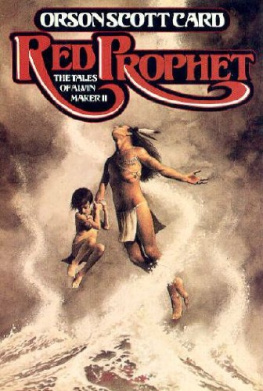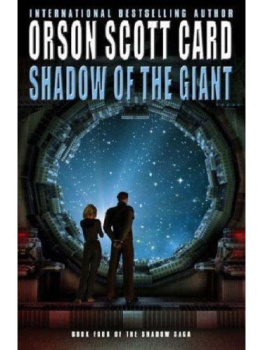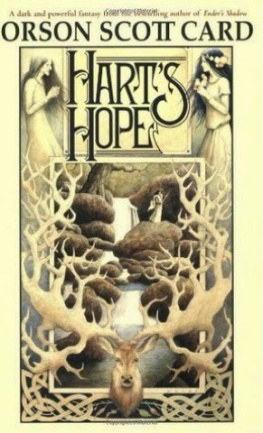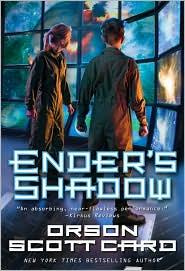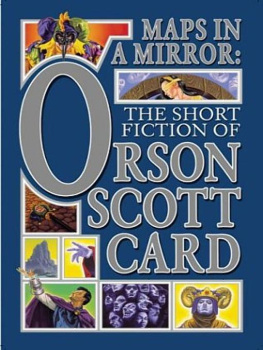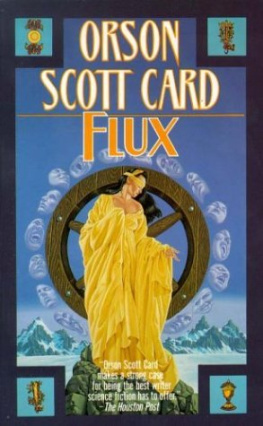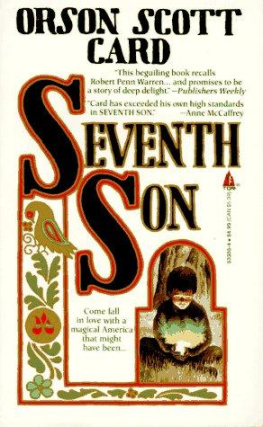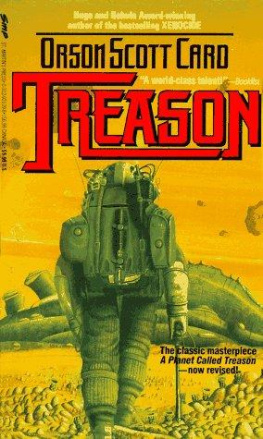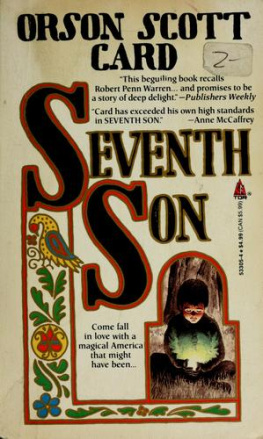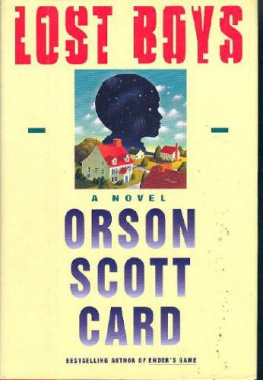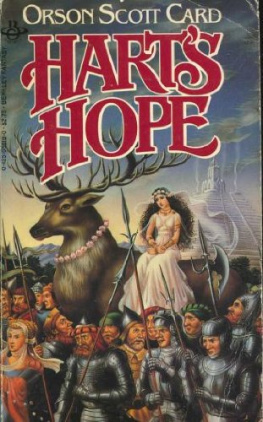Orson Scott Card
Wyrms
To Mark and Rana, for greatness of heart
Chapter 1. THE HEPTARCITS DAUGHTER
HER TUTOR WOKE HER WELL BEFORE DAWN. Patience felt the chill of the morning through her thin blanket, and her muscles were stiff from sleeping on a hard mat on the floor. Summer was definitely over, and she allowed herself to wish, however briefly, that the north-facing window of her room might be glazed-or at least shuttered-for the winter.
It was all part of Father's training, to harden and toughen her, to make her despise the luxuries of court and the people who lived for them. She assumed that Angel's ungentle hand on her shoulder was a part of the regimen. What, did I smile in my sleep? Did it look like my dreams were sweet? Thank you, Angel, for rescuing me before I was corrupted forever by some imaginary delight.
But when she saw Angel's face, his worried look told her that something was quite wrong. It was not so disturbing that he worried, as that he let her see he worried; ordinarily he could hide or show any emotion at will, and had trained her to do the same.
"The King has a task for you," whispered Angel.
Patience cast off her blanket, took up the bowl of icy water on the windowsill, and poured it over her head.
She refused to let her body flinch at the cold. She toweled herself roughly with burlap until the skin all over her body tingled.
"Does Father know?" she asked.
"Lord Peace is in Lakon," said Angel. "Whether he knows or not is no help to you here."
She knelt quickly beneath the ikon that was her room's only decoration. It was a shimmering engraving of the starship Konkeptoine, cut into bright green crystal. It was worth more than the price of a poor man's house. Patience liked the contrast between the deliberate poverty of her room and the opulence of her religious display. The priests would call it piety. She thought of it as irony.
Patience murmured the Come Kristos in eight seconds- she had it down to a science-kissed her fingers and touched them to the Konkeptoine. The crystal was warm.
After all these years, still alive. No doubt it was almost hot when her mother touched it, when she was a girl. And long before Patience would have a daughter, it would be cold and dead, the light gone out of it.
She spoke to Angel over her shoulder. "Tell me the task King Oruc has set for me."
"I don't know. Only that he called for you. But you can guess, can't you?"
Angel was testing her, of course. It was the story of her life, test after test. She complained about it, sometimes, but the truth was she enjoyed it, took pleasure in solving the diplomatic puzzles that Father and Angel constantly put to her.
So-what could King Oruc want her to do? The Heptarch had never called for her before. She had often been in Heptagon House, of course, but only when summoned to play with one of the Heptarch's children, never to perform a task for the Heptarch himself. Which was to be expected. At the age of thirteen, she was hardly old enough to expect a calling from the King.
Yesterday, though, an embassy had arrived from Tassali, a kingdom in the East which, in ancient times, had once been under the suzerainty of the Heptarch of Korfu. That meant little: All seven parts of the world had once been ruled by the Heptarchy, and Tassali had been free of Korfu for a thousand years. Prekeptor, the only prince and heir presumptive of Tassali, a sixteen-year-old boy, had come with an array of high-ranking Tassaliki and very expensive gifts. From this information Patience had already concluded the obvious-that the embassy was there to conclude a marriage treaty with one of King Oruc's three daughters.
The dowry had no doubt been negotiated a year ago, before the embassy set out. One does not send a royal heir to meet the bride until most of the details of the treaty are set. But Patience could guess easily enough that one remaining point of negotiation was bound to be the question: Which daughter? Lyra, the eldest daughter, fourteen years old and second in line to the Heptarchy?
Rika, who was only a year younger than Patience and easily the brightest of the Heptarch's children? Or the baby, Klea, now only seven years old but certainly old enough to be married off if politics demanded it?
Patience could think of only one task she might perform in connection with this visit. She was fluent in Tassalik, and she seriously doubted that Prince Prekeptor spoke a word of Agarant. They were quite provincial in Tassali and clung to their dialect tenaciously. If a meeting were to take place between Prekeptor and one of Oruc's daughters. Patience would be an excellent interpreter.
And since Klea was an unlikely candidate and Rika could speak passable Tassalik, it was most likely that the chosen daughter was Lyra.
All this reasoning took place while Patience pulled on her silk chemise. She turned to face Angel then, and smiled. "I'm to be the interpreter between Prekeptor and Lyra, when they meet today so they can decide whether they detest each other so much it is worth causing an international quarrel to avoid being married."
Angel smiled. "It seems the most likely thing."
"Then I must dress to take part in an official meeting between future sovereigns. Would you call Nails and Calico to me?"
"I will," said Angel. But he stopped at the door.
"You must realize," he said, "that Prekeptor will know who you are."
It was a warning, and Patience understood very well that King Oruc was playing a dangerous game, putting her in the middle of a political situation so closely involved with royal succession. Especially with Father away.
Oruc must have planned this for some time, to have Father away on a trivial matter. Ordinarily, Lord Peace would have been at the heart of the negotiations over such a vital alliance.
Nails and Calico, her dressing maids, came in, trying to seem light and cheerful, when obviously they had been aroused from deep-and, in Calico's case, drunken- slumber. Patience selected her gown and wig and endured their ministrations as they turned her into a poppet.
"Called to the King," Nails kept saying. "What honor, for a daughter of a slave."
It was annoying to have her father called a slave over and over again, but she knew that Nails was not being malicious, merely stupid. And as Father always said, 'Never be angry when fools behave like fools'. Its better when fools identify themselves, Patience reminded herself.
It removes so much uncertainty.
When the women were finished, the sun was just coming up. She dismissed them and opened the small brass case that contained the diplomatic equipment Father and Angel had decided she was old enough to use discreetly.
For self-defense, a loop, of course. It was a long strand of incredibly strong plastic, so fine that it was almost invisible. It could cut through flesh with only a little pressure. It had knobs of plastic on both ends, so Patience could grasp it without slicing off her fingers.
And for attack, a glass pendant which contained a swarm of pinks, almost invisibly tiny insects that homed in on human eyes and in a matter of minutes would build honeycomb nests that always resulted in blindness within hours. If the eyes were not removed quickly, the pinks would bore through to the brain and cause chronic, permanent palsy. A vicious weapon, but Angel always said that a diplomat who is not prepared to kill had better be prepared to die. She tipped back her head and put drops in her eyes, of a liquid that would kill pinks on contact.
It would stay in her eyes for hours. As Father said, 'Never carry a weapon that can be used against you.'
Next page

